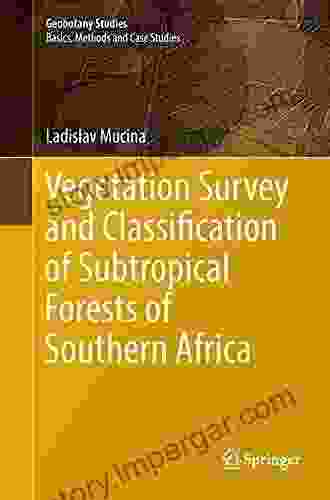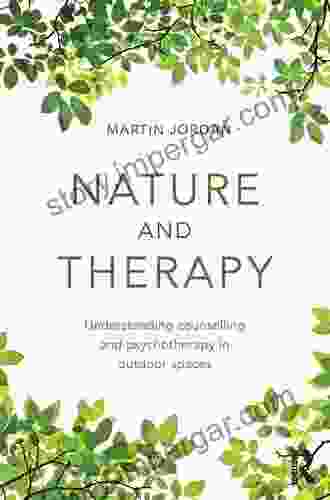Unveiling the Transformative Power of Nature: Understanding Counselling and Psychotherapy in Outdoor Spaces

In today's fast-paced and digitized world, we crave spaces where we can connect with ourselves, others, and the environment. Counselling and psychotherapy in outdoor spaces offers a unique and transformative approach to healing and personal growth. This article delves into the key concepts, benefits, and considerations surrounding this burgeoning field.
The Essence of Outdoor Therapy
Outdoor therapy, also known as ecotherapy or nature-based therapy, embraces the natural world as a co-therapist in the healing process. It involves conducting counselling or psychotherapy sessions in natural environments such as parks, forests, gardens, or near water bodies. By stepping out of the confines of the traditional therapy room, outdoor therapy creates an immersive experience that fosters a deep connection with nature and promotes overall well-being.
4.5 out of 5
Benefits of Outdoor Counselling and Psychotherapy
Enhanced Relaxation and Stress Reduction
Being in nature has a calming effect on the mind and body. Studies have shown that spending time outdoors can lower blood pressure, reduce stress hormones, and promote relaxation. The natural environment provides a sensory-rich setting that engages our senses and helps us escape from the demands of daily life.
Improved Mood and Emotional Regulation
Exposure to green spaces has been linked to improved mood and reduced anxiety. Natural light and fresh air can boost endorphin production and elevate serotonin levels, resulting in a more positive and balanced emotional state. Outdoor therapy can provide a safe and supported space for individuals to explore and process their emotions.
Increased Self-Awareness and Personal Growth
The challenges and beauty of nature can mirror our own inner experiences and struggles. By engaging with the natural world, we can gain insights into our thoughts, feelings, and behaviors. Outdoor therapy often involves activities such as hiking, gardening, or simply observing the environment, which can facilitate self-reflection and promote personal growth.
Enhanced Physical Well-being
Spending time outdoors has numerous physical health benefits, including improved cardiovascular health, increased physical activity, and exposure to vitamin D. Outdoor therapy can incorporate activities that encourage movement and physical engagement, contributing to overall physical well-being.
Increased Connection with Others
Nature can provide a neutral and inviting space for interpersonal connection. Outdoor therapy groups or workshops offer opportunities to build relationships with others in a supportive and non-judgmental environment. Shared experiences in nature can foster a sense of community and belonging.
Key Considerations
Selection of Natural Environment
The choice of outdoor space should be tailored to the needs and preferences of the individual or group. Factors to consider include the size, accessibility, privacy, and availability of natural features such as trees, water, and open spaces.
Weather and Safety Precautions
Outdoor therapy requires careful planning to ensure safety and comfort. Considerations include appropriate clothing, sun protection, weather conditions, and emergency preparedness. Therapists should be trained in wilderness first aid and have a plan in place for managing inclement weather.
Ethical Considerations
Outdoor therapy professionals must respect the environment and minimize their impact on natural habitats. This includes adhering to ethical guidelines for group size, noise levels, and waste disposal. Therapists should also be sensitive to the needs and rights of others using shared outdoor spaces.
Understanding Counselling and Psychotherapy in Outdoor Spaces highlights the transformative power of nature in the healing and personal growth process. By embracing the natural world as a co-therapist, outdoor therapy provides a unique and holistic approach to addressing a wide range of mental health and emotional issues. Through relaxation, emotional regulation, self-awareness, physical well-being, and social connection, outdoor therapy empowers individuals and groups to thrive and live more fulfilling lives. As the field continues to evolve, it holds immense promise for the future of mental health care.
4.5 out of 5
Do you want to contribute by writing guest posts on this blog?
Please contact us and send us a resume of previous articles that you have written.
 Book
Book Novel
Novel Page
Page Chapter
Chapter Text
Text Story
Story Genre
Genre Reader
Reader Library
Library Paperback
Paperback E-book
E-book Magazine
Magazine Newspaper
Newspaper Paragraph
Paragraph Sentence
Sentence Bookmark
Bookmark Shelf
Shelf Glossary
Glossary Bibliography
Bibliography Foreword
Foreword Preface
Preface Synopsis
Synopsis Annotation
Annotation Footnote
Footnote Manuscript
Manuscript Scroll
Scroll Codex
Codex Tome
Tome Bestseller
Bestseller Classics
Classics Library card
Library card Narrative
Narrative Biography
Biography Autobiography
Autobiography Memoir
Memoir Reference
Reference Encyclopedia
Encyclopedia Matthew Inman
Matthew Inman Sun Young Rieh
Sun Young Rieh Margaret M Johnson
Margaret M Johnson Mary Watkins
Mary Watkins Matthew Schlueb
Matthew Schlueb Nizan Shaked
Nizan Shaked Mark K Updegrove
Mark K Updegrove Tomas Brytting
Tomas Brytting Marvin Perry
Marvin Perry Mark P Holtzman
Mark P Holtzman Nancy R Poland
Nancy R Poland Susan North
Susan North Radmila Moacanin
Radmila Moacanin Maria Csuros
Maria Csuros Max Holland
Max Holland Mary Beard
Mary Beard William Mcinnes
William Mcinnes Mary Ann Kirkby
Mary Ann Kirkby Mary Joy Mackay
Mary Joy Mackay Mark C Wilkins
Mark C Wilkins
Light bulbAdvertise smarter! Our strategic ad space ensures maximum exposure. Reserve your spot today!

 Sean TurnerEmbark on a Thrilling Expedition to Alaska's Untamed Wilderness: My Quest in...
Sean TurnerEmbark on a Thrilling Expedition to Alaska's Untamed Wilderness: My Quest in...
 Efrain PowellUnlocking the Enigmatic Realm of Sexualities and Communities: A Captivating...
Efrain PowellUnlocking the Enigmatic Realm of Sexualities and Communities: A Captivating... Henry HayesFollow ·12k
Henry HayesFollow ·12k Albert CamusFollow ·11.2k
Albert CamusFollow ·11.2k Bernard PowellFollow ·18.5k
Bernard PowellFollow ·18.5k Connor MitchellFollow ·6.2k
Connor MitchellFollow ·6.2k Curtis StewartFollow ·12.8k
Curtis StewartFollow ·12.8k Steven HayesFollow ·18.2k
Steven HayesFollow ·18.2k David MitchellFollow ·10.9k
David MitchellFollow ·10.9k Dawson ReedFollow ·17.5k
Dawson ReedFollow ·17.5k

 Roberto Bolaño
Roberto BolañoUnveiling the Beauty and History of the Medici Iris: A...
In the realm of...

 Theodore Mitchell
Theodore MitchellImproving Gut Health in Poultry: Unlocking the Path to...
In the ever-evolving field of...

 Victor Hugo
Victor HugoPersonalized Medicine with a Nanochemistry Twist:...
The future of healthcare...

 George Martin
George MartinA Year Of Wine: Perfect Pairings Great Buys And What To...
## Year of Wine: An Epic Journey Through the...

 Tom Hayes
Tom HayesDelve into the Enigmatic World of Southern Africa's...
Embark on a captivating journey through the...
4.5 out of 5










